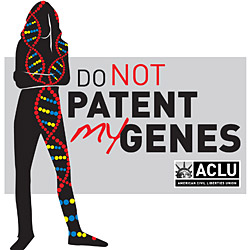ACLU Lens: Appeals Court Hears Case Challenging Patents on Breast Cancer Genes


A crowd of scientists, medical professionals and legal scholars packed the U.S. Court of Appeals for the Federal Circuit yesterday to hear an appeal in our lawsuit challenging the patents on two human genes associated with hereditary breast and ovarian cancer.
The ACLU and the Public Patent Foundation brought a lawsuit in May 2009 against the U.S. Patent and Trademark Office (USPTO), Myriad Genetics and the University of Utah Research Foundation, which hold the patents on the genes, BRCA1 and BRCA2. The lawsuit charges that the patents restrict both scientific research and patients' access to medical care, and that patents on human genes are illegal because genes are "products of nature." The groups brought the case on behalf of breast cancer and women's health groups, individual women, geneticists and scientific associations representing approximately 150,000 researchers, pathologists and laboratory professionals.
As we've said before, a human gene is a product of nature and no more patentable than other parts of the body. ACLU attorney Chris Hansen made the point succinctly yesterday: "If a surgeon cuts me open, and slices out my kidney and takes it out and hold it in his hand, it's an isolated kidney - but it's still a kidney. It's not an invention."

Plaintiffs, attorneys and friends after oral arguments Monday.
In March 2010, a New York federal court ruled in our favor, holding that the patents are illegal. Yesterday, the court heard an appeal of that ruling filed by Myriad and the University of Utah. The court granted the USPTO's request that it be released as a defendant in the lawsuit.
Adding to yesterday's excitement, the U.S. government had filed a friend-of-the-court brief agreeing with us that isolated DNA is not patentable, and yesterday our lawyers were joined at the table by acting U.S. Solicitor General Neal Katyal, who also presented arguments.
You can hear an audio recording of the arguments .
In the news:
- MedPageToday.com:
- Nature.com:
- TheAtlantic.com:
- AFP:
Get more information about the case and the plaintiffs here.
Take action: to our plaintiffs.
Learn more about the case challenging gene patents: Subscribe to our newsletter, , and .

